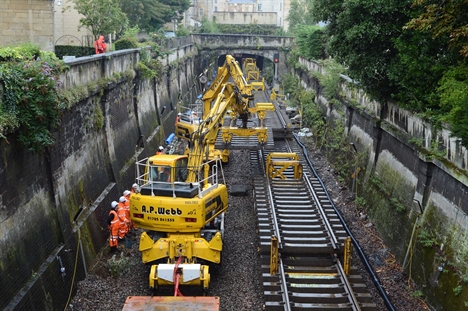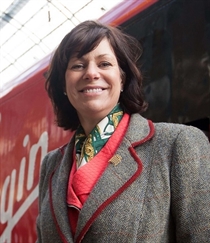07.10.15
‘Give Hendy three years; if he can’t do it, no-one can’, says Anthony Smith
Transport Focus chief executive Anthony Smith has called on the government to resist the urge to impose structural change on Network Rail while new chair Sir Peter Hendy is still getting to grips with the role.
In response to a question from the audience at a fringe session at the Conservative Party Conference in Manchester yesterday that called for the break-up and privatisation of Network Rail, Smith (pictured above) said: “Personalities are very important. Having Peter Hendy at the top is an absolute crucial appointment. I wouldn’t change anything until you’ve given him three years. If he can’t sort it out, no-one can. He will give the ‘air cover’ and political armour that Network Rail I think needs to make reasonable promises and get everyone on the same page.”
Rail minister Claire Perry MP told the session, organised by the Rail Delivery Group: “There are two really important reviews being led right now on both the structure and the funding of Network Rail, and the relationship [between] Network Rail and the Department [for Transport]. Network Rail has gone back on the balance sheet, it’s a public asset.”
She said the “Railtrack experience” meant she was “happy with it being a public asset, from a safety and network point of view – but that’s not to say there can’t be different structures”.
She also offered praise for Network Rail and the “fabulous” engineering projects it has been responsible for recently, from Dawlish and Bathampton to the station rebuilds at Reading, Birmingham New Street and Manchester Victoria.

SMEs found the electrification pause a ‘major problem’
Roy Freeland, president of Perpetuum Ltd, representing the Rail Supply Group (RSG), criticised the ‘pause’ in major electrification projects, recently restarted by the government on Hendy’s advice. He told the fringe session: “Frankly, SMEs particularly did not appreciate the recent suspension of the electrification work for the Hendy report. [It may have been] necessary, but the disruption and uncertainty is a major problem, particularly for SMEs.”
Expanding on this later in the session, he said: “I was reporting to the RSG Council on the business secretary’s request that we should enhance productivity, and in the same meeting I’m having to report that SMEs are very worried about the pause in the work. The two don’t sit well together.”
Freeland also called for a big boost in UK rail supply chain exports, since France’s export rate is double ours and Germany’s proportion is five times as big.
‘I’d love to reverse all the Beeching cuts’ – Perry
 Many audience members were angry over the state of their local rail services, and many called for line reopenings and other infrastructure upgrades.
Many audience members were angry over the state of their local rail services, and many called for line reopenings and other infrastructure upgrades.
After fielding such questions relating to the railway networks in Cumbria, Devon, East Anglia and the mooted BML2 project for Sussex, Perry said: “I would love to reverse all the Beeching cuts, it would be amazing to go back to that…[but] there is money being spent, we are reopening stations, we are rebuilding lines.”
Paul Plummer, group strategy director at Network Rail, who is the incoming chief executive of the Rail Delivery Group replacing Michael Roberts, told the session that he felt devolution to the routes within Network Rail “didn’t go far enough” and should have been pushed harder to improve accountability and efficiency.
In responses to reports from audience members of poor customer service, he said: “The industry does care. But we shoot ourselves in the foot all the time by giving the impression that we don’t.”
Lessons from TfL
Smith suggested that Transport for London might have lessons for the national network on customer service and responsiveness during delay, saying its staff had been “liberated” to engage more with passengers to explain delays and other problems.
Perry said the industry’s main goal is to remember that passengers are people, “not a dot on a ped-flow model”, so it is no good blaming passengers for long dwell times and poor performance because passengers do not get on and off trains like they ‘should’.
Open access
She was also challenged by an audience member on why the government is limiting competition by not doing more to encourage open access operators, when all the evidence shows that they drive up passenger satisfaction by offering choice. Perry said there was a review going on into this at the moment, and said she was frustrated at how bad some journeys are, particularly east-west journeys in northern England like Carlisle-Newcastle and Leeds-Manchester.
Smith asked why, with satisfaction ratings generally positive for the rail industry, there was majority support for renationalisation – and he suggested it was because people still don’t “trust” the railway companies.